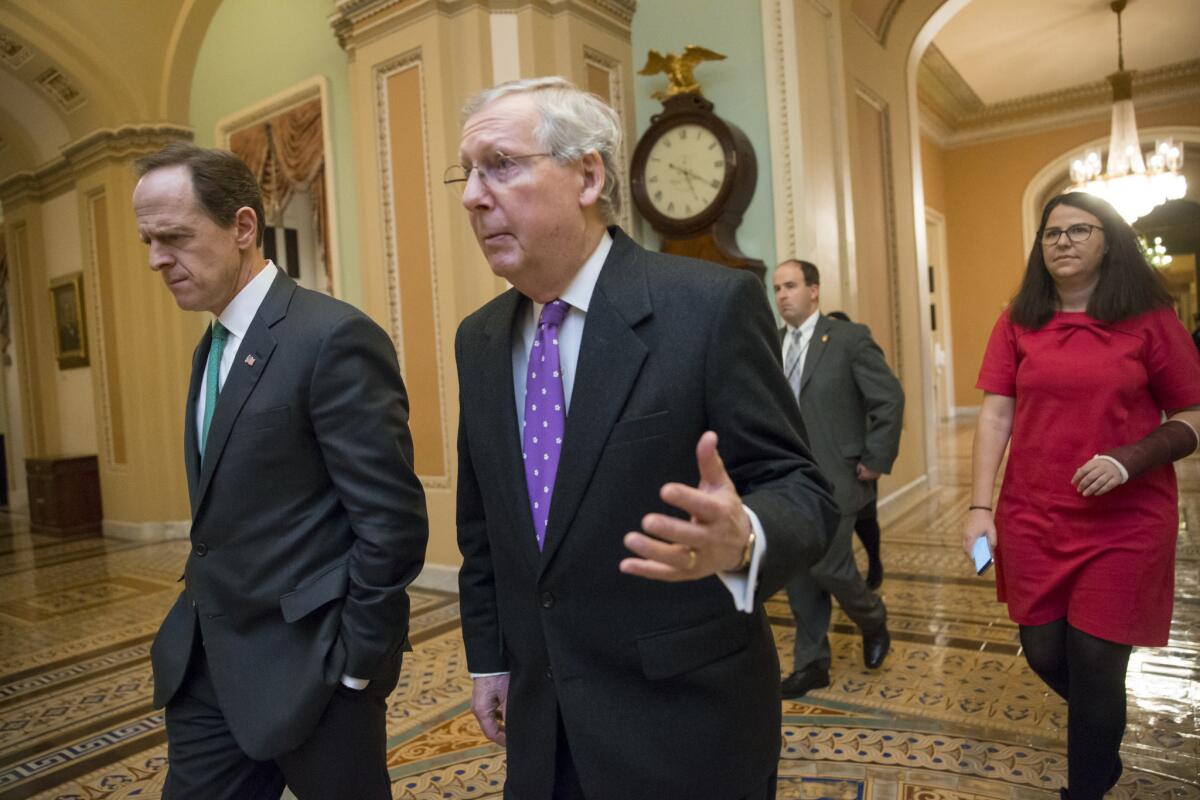Editorial: Nominating Supreme Court justices is Obama’s job. Let him do it.

Senate Majority Leader Mitch McConnell, right, has said the next president should be the one to fill the Supreme Court vacancy left by the death of Antonin Scalia.
- Share via
Justice Antonin Scalia had been dead only a few hours when Senate Majority Leader Mitch McConnell announced that the Senate wouldn’t act on any replacement proposed by President Obama. “The American people should have a voice in the selection of their next Supreme Court justice,” McConnell (R-Ky.) said. “Therefore, this vacancy should not be filled until we have a new president.”
This is self-serving sophistry. The American people do have a voice in any nomination Obama makes. They “spoke” when they elected him to a second term that has 11 months remaining. His authority to nominate Supreme Court justices is no more diminished by his supposed lame-duck status than any of his other constitutional powers.
The Senate also has a constitutional duty: to consider presidential nominees expeditiously. A long vacancy is undesirable in part because a court comprised of only eight members raises the possibility of 4-4 decisions that, while they affirm a lower court’s decision, don’t create a national precedent.
The obstructionism being threatened by Senate Republicans is outrageous. It would be equally so if the circumstances were reversed and a Republican president in the last year of his term were sending a nominee to a Democratic Senate. That nominee also would deserve prompt consideration.
No doubt it’s galling for Senate Republicans that Scalia’s sudden death creates the possibility of a third Obama appointee and one, moreover, who is almost certainly not going to share Scalia’s strikingly narrow view of the Constitution.
But there is no truth to the idea that Supreme Court nominations in an election year have an inferior status. Some Republicans have cited the so-called Thurmond Rule, a supposed tradition that the Senate need not act on judicial nominations in an administration’s final year. It is named after the late Sen. Strom Thurmond, who along with other senators successfully blocked President Lyndon B. Johnson’s attempt to promote Abe Fortas to chief justice in 1968, a presidential election year. But the “rule” has no formal status and has not been consistently honored. Justice Anthony M. Kennedy, for example, was confirmed in 1988.
There is no truth to the idea that Supreme Court nominations in an election year have an inferior status. Justice Anthony M. Kennedy, for example, was confirmed in 1988.
As a matter of practical politics, the Republican majority in the Senate — and the fact that Supreme Court nominations may be filibustered — make it unlikely that Obama would nominate a strident or doctrinaire liberal. But, like any president, he is likely to choose a candidate with whom he feels a philosophical affinity.
If Obama’s eventual choice resembles the impressive judges he has appointed to the U.S. Court of Appeals for the District of Columbia Circuit, it will be hard for Republicans in the Senate to denounce that nominee as a radical. Republicans will still have the option of opposing the nominee, but if their only rationale is that they don’t want to confirm an appointment by a Democratic president, their partisanship and disrespect for the court will be blatantly obvious.
It’s true that both parties in the Senate in recent years have reacted to judicial nominations with excessive partisanship. President Ronald Reagan’s nomination of Scalia to the court was confirmed by a vote of 98 to 0 in 1986. President Bill Clinton’s nomination of Ruth Bader Ginsburg was approved 96 to 3 in 1993. It’s inconceivable that any nominee, however moderate, would receive such an overwhelming margin of support today. Chief Justice John G. Roberts Jr. was confirmed in 2005 by a vote of 78 to 22; all of the no votes were cast by Democrats (including then-Sen. Barack Obama). In 2010, 36 Republicans (and only one Democrat) voted against confirmation of Justice Elena Kagan.
This increased partisanship may have infected the court itself, with justices being publicly lobbied to time their retirements so that they will be replaced by a president of their own party. To prevent such gamesmanship, some have proposed that the Constitution be amended to provide for fixed but generous terms for Supreme Court justices. It’s an idea worth considering.
In the meantime, election-year partisanship should not prevent either the president or the Senate from doing their respective duties. After consulting with the Senate, Obama should nominate a successor for Scalia who commands broad respect; Republicans in the Senate should then give him or her fair consideration and an up-or-down vote.
ALSO
Antonin Scalia and the judgment of history
How about an honest debate over filling Justice Scalia’s seat?
Justice Scalia kept constitutional originalism in the conversation — no small legacy
More to Read
A cure for the common opinion
Get thought-provoking perspectives with our weekly newsletter.
You may occasionally receive promotional content from the Los Angeles Times.









